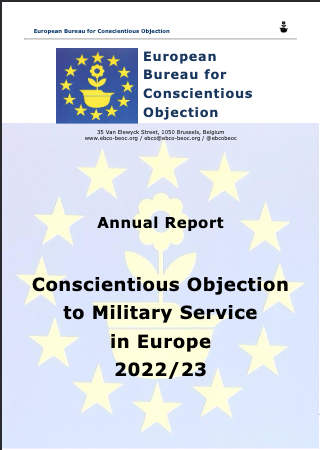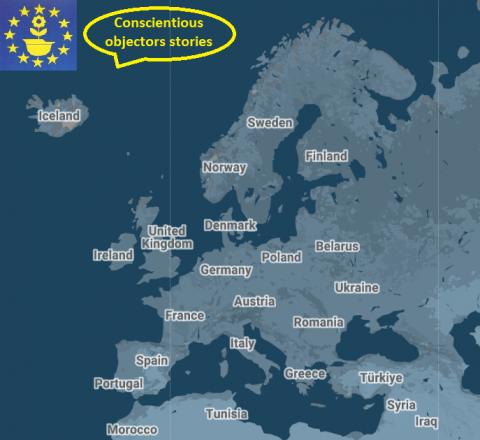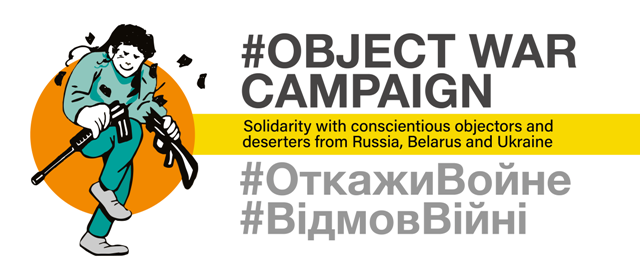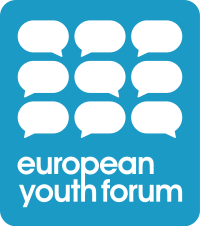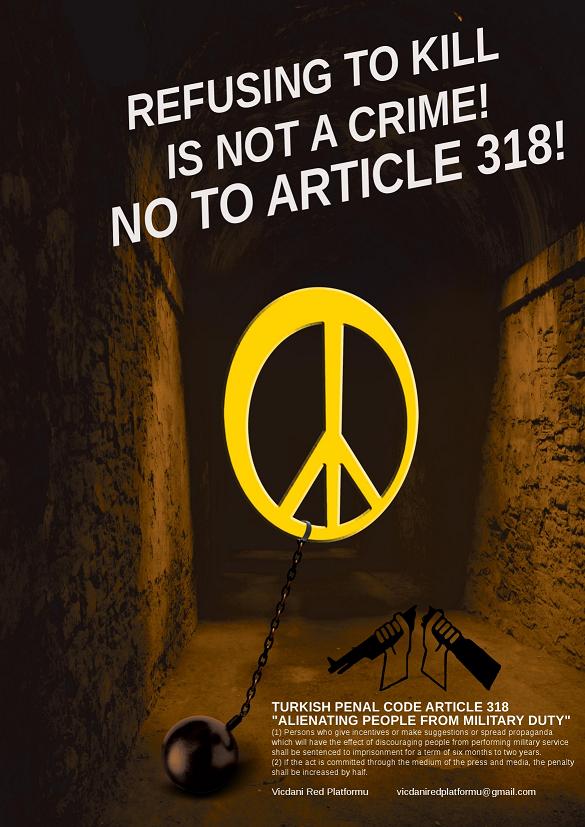Call to boycott the Conscience Examination Committee
Athens 10/12/2016
The Association of Greek Conscientious Objectors calls on those who have submitted applications in order to be recognized as conscientious objectors and perform alternative service, to boycott, from now on, the Conscience Examination Committee. The existence of a committee, which, like another Holy Inquisition, interrogates the conscientious objectors, violates any sense of the protected right to freedom of conscience.
Furthermore, this interrogation, under the threat of rejection and the subsequent sanctions for insubordination in case the rejected persons insist in their conscientious objection, leads to the collection of data (profiling) of people, based, among other things, on their political beliefs, which they are kept in records of the Ministry of National Defence. What's even worse, the Committee has recently exercised unacceptable pressure to the conscientious objectors under examination, in order to reveal other comrades in their political activities,[i] sometimes even asking the latter to act as testifiers in order to confirm the claims of the applicants. This results either in the profiling of persons beyond the objector under examination, or in the rejection of any applicant who refuses to do so.
Often, there have been also complaints of misrepresentation of what the conscientious objectors had said, in the written records, even after the practice of recording the interviews has started.
Moreover, the composition of the present committee, with the participation of military officers, is unacceptable in itself, both for us as conscientious objectors, as well according to the international standards. The same is true for the fact that the decision is taken by the (Deputy) Minister of National Defence. While, in the past, there was even a case, as proven by the records, where the Committee hold a session with more military officers present than those stipulated by the law.
The committee has lead to gross discrimination against those objectors stating ideological grounds, with about half of them being rejected throughout the years, as well against those objectors stating religious grounds if they are not baptized Jehovah's Witnesses.
We would like to remind that the present procedure of examination of conscientious objectors in Greece, violates even the international human rights standards, as it has been pointed out by all the institutional international and domestic bodies:
- The European Parliament has repeatedly stated through its resolutions that no committee can penetrate the conscience of an individual and has asked for a declaration to be sufficient for someone in order to be recognized as objector.[ii]
- Furthermore the [Greek] Ombudsman has challenged the procedure of examination of objectors through interview stating that “Personal interview as a mean to ascertain reasons of conscience is controversial per se insofar it submits an internal esprit to an examination of sincerity”.[iii]
- The demand to abolish the examination by a conscience examination committee is supported as well by the Hellenic League for Human Rights.[iv]
- In any case, even when there is an examination, the UN Human Rights Committee[v] and the Commissioner for Human Rights of the Council of Europe[vi] have asked, for this examination to be placed under the full control of civilian authorities, outside the Ministry of Defence.
- The Parliamentary Assembly of the Council of Europe has set specific basic principles as of the procedure, stating among other things that where the decision regarding the recognition of the right of conscientious objection is taken in the first instance by an administrative authority, the decision-taking body shall be entirely separate from the military authorities and its composition shall guarantee maximum independence and impartiality.[vii]
- Similar recommendations have been made by the National Commission for Human Rights, which, in any case, has asked for the composition of the Conscience Examination Committee to be changed by adding more civilian, i.e. non military, members.[viii]
- While it is known that the European Court of Human Rights has recently convicted Greece in the Papavasilakis' case, not only because of the capability of the Conscience Examination Committee to hold a session with a majority of military officers, but also because the final decision of the Minister of Defence on the basis of a draft ministerial decision following the Committee's proposal, does not afford the requisite safeguards of impartiality and independence.
Based on all the above, and before the intertemporal intransigence of all governments to proceed, at least, to a change of the procedure of examination and of the composition of the committee, we don't have other choice than calling the conscientious objectors to boycott it. We call on conscientious objectors to report and declare before the Conscience Examination Committee that they refused to be examined and to answer to their questions.
We stress the fact that this should by no means result to their rejection, moreover since, according to the current legislation, even if they do not report, their application should be put into judgment.[ix]
Abolish the examination of objectors and the Conscience Examination Committee!
The right to conscientious objection is inalienable! Not even one hour in the army!
Association of Greek Conscientious Objectors
[i] See a relevant denunciation in the text (in Greek) “My experience from the examination for my recognition as a conscientious objector by the competent committee”.
[ii] European Parliament, Resolution on Conscientious Objection [known as the Macciocchi Resolution] 7 February 1983, as published in the Official Journal of the European Communities C68, 14 March 1983, para. no 3 (page 15), and Resolution on conscientious objection and alternative civilian service [known as the Schmidbauer Resolution], 13 October 1989, as published in the Official Journal of the European Communities C291, 20 November 1989, para. A (p. 123) and para. 4 (p. 124).
[iii] Ombudsman, Examination of applications for recognition of conscientious objectors, (in Greek) http://www.synigoros.gr/?i=metaxeirisi.el.imnode2.264999
[iv] See Letter of the then Chair, Dimitris Christopoulos, on behalf of the Board of the Hellenic League for Human Rights (2005) (in Greek) http://www.hlhr.gr/index.php?MDL=pages&SiteID=471, para. 6.
[v] UN Human Rights Committee , Concluding observations on the initial report of Greece, 25 April 2005, CCPR/CO/83/GRC, para. 15. UN Human Rights Committee, Concluding observations on the second periodic report of Greece, 3 December 2015, CCPR/C/GRC/CO/2, paras. 37-38.
[vi] Assessment of the progress made in implementing the recommendations of the Council of Europe Commissioner for Human Rights, Follow-up report on the Hellenic republic (2002 – 2005), 29 March 2006. https://wcd.coe.int/ViewDoc.jsp?id=984125#P135_14233, para. 34.
[vii] Council of Europe, Parliamentary Assembly, Resolution 337 (1967), Right of conscientious objection, para. b2.
[viii] GNCHR, Observations on article 12 of the bill of the Ministry of National Defence “Settlement of issues concerning transfer of soldiers, care for staff and other provisions” (Conscientious Objectors), (20.1.2016), III, Special Observations on article 12 of the bill, para. 4.
[ix] Decision of the Minister of National Defence Φ.420/79/81978/Σ.300/21-12-2005, (Government's Gazette B, 1854/29-12-2005), article 3, para. 5.

